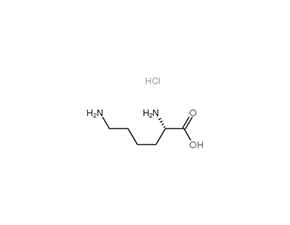
L-Lysine hydrochloride
CAS No. 657-27-2
L-Lysine hydrochloride( Lysine hydrochloride )
Catalog No. M21400 CAS No. 657-27-2
L-lysine hydrochloride is an essential amino acid for humans with various benefits including treating herpes increasing calcium absorption reducing diabetes-related illnesses and improving gut health.
Purity : >98% (HPLC)
 COA
COA
 Datasheet
Datasheet
 HNMR
HNMR
 HPLC
HPLC
 MSDS
MSDS
 Handing Instructions
Handing Instructions
| Size | Price / USD | Stock | Quantity |
| 500MG | 35 | Get Quote |


|
| 1G | Get Quote | Get Quote |


|
Biological Information
-
Product NameL-Lysine hydrochloride
-
NoteResearch use only, not for human use.
-
Brief DescriptionL-lysine hydrochloride is an essential amino acid for humans with various benefits including treating herpes increasing calcium absorption reducing diabetes-related illnesses and improving gut health.
-
DescriptionL-lysine hydrochloride is an essential amino acid for humans with various benefits including treating herpes increasing calcium absorption reducing diabetes-related illnesses and improving gut health.(In Vivo):L-lysine treatment attenuates pancreatic tissue injury induced by L-arginine by inhibiting the release of the inflammatory cytokine IL-6 and enhances antioxidant activity. Pre- or post-treatment with L-lysine leads to significant decreases in the levels of malondialdehyde and nitric oxide, while significant enhancement is observed in the activities of antioxidant enzymes (superoxide dismutase, catalase, and glutathione peroxidase) and glutathione. L-lysine supplementation almost completely ameliorates vascular calcification. Dietary L-lysine strongly suppresses plasma intact parathyroid hormone in adenine rats and supports a proper bone-vascular axis. The conserved orientation of the femoral apatite in group Lys also evidences the bone-protective effects of L-lysine. Dietary L-lysine elevates plasma alanine, proline, arginine, and homoarginine but not lysine. The dose-dependent delay in gastric emptying observed in rats is confirmed in humans with an increase in halftime of gastric emptying of 4 min/g L-lysine. Moreover, a dose-dependent increase in intestinal fluid accumulation is observed (0.4 mL/min/g L-lysine).
-
In Vitro——
-
In VivoL-lysine treatment attenuates pancreatic tissue injury induced by L-arginine by inhibiting the release of the inflammatory cytokine IL-6 and enhances antioxidant activity. Pre- or post-treatment with L-lysine leads to significant decreases in the levels of malondialdehyde and nitric oxide, while significant enhancement is observed in the activities of antioxidant enzymes (superoxide dismutase, catalase, and glutathione peroxidase) and glutathione. L-lysine supplementation almost completely ameliorates vascular calcification. Dietary L-lysine strongly suppresses plasma intact parathyroid hormone in adenine rats and supports a proper bone-vascular axis. The conserved orientation of the femoral apatite in group Lys also evidences the bone-protective effects of L-lysine. Dietary L-lysine elevates plasma alanine, proline, arginine, and homoarginine but not lysine. The dose-dependent delay in gastric emptying observed in rats is confirmed in humans with an increase in halftime of gastric emptying of 4 min/g L-lysine. Moreover, a dose-dependent increase in intestinal fluid accumulation is observed (0.4 mL/min/g L-lysine).
-
SynonymsLysine hydrochloride
-
PathwayOthers
-
TargetOther Targets
-
RecptorOthers
-
Research AreaInflammation/Immunology
-
IndicationPharyngitis
Chemical Information
-
CAS Number657-27-2
-
Formula Weight182.65
-
Molecular FormulaC6H15ClN2O2
-
Purity>98% (HPLC)
-
SolubilityH2O:100 mg/mL (547.50 mM)
-
SMILESNCCCC[C@@H](C(O)=O)N.Cl
-
Chemical NameL-Lysine hydrochloride (1:1)
Shipping & Storage Information
-
Storage(-20℃)
-
ShippingWith Ice Pack
-
Stability≥ 2 years
Reference
1.Al-Malki AL et al. Suppression of acute pancreatitis by L-lysinein mice. BMC Complement Altern Med. 2015 Jun 23;15:193.
molnova catalog



related products
-
Tetracosactide
Tetracosactide (INN) is a synthetic peptide that is identical to the 24-amino acid segment (sequence: SYSMEHFRWGKPVGKKRRPVKVYP) at the N-terminal of adrenocorticotropic hormone.
-
Tortoside B (Manglie...
Manglieside E significantly (p<0.05) increased the growth and differentiation of osteoblastic MC3T3-E1 cells.
-
Pteropodine
Pteropodine acts as a positive modulator of muscarinic M(1) and 5-HT(2) receptors. Pteropodine shows antigenotoxic, antioxidant and lymphocyte induction effects, it also shows strong apoptotic effect on acute leukaemic lymphoblasts.



 Cart
Cart
 sales@molnova.com
sales@molnova.com


